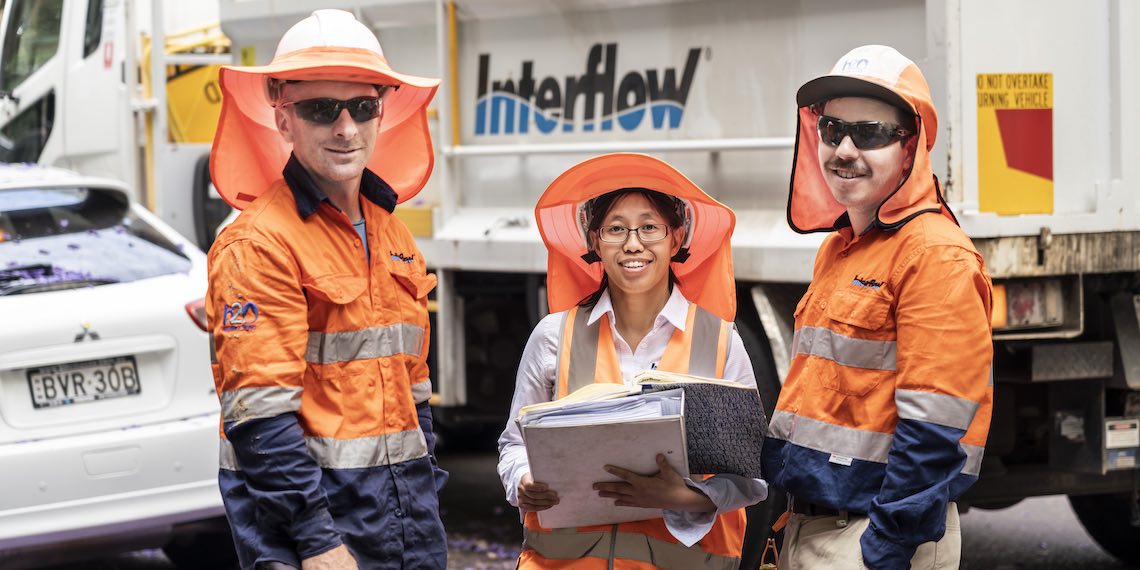How this company is supporting staff mental health all year round

Water sector companies are well versed in operational workplace health and safety, but October, Mental Health Month, is offering businesses the opportunity to reflect on supporting staff in mental wellness, particularly during the pandemic.
With a workforce of almost 600 employees across Australia and New Zealand, pipeline infrastructure company Interflow is aware of the benefits that mental health support provides to its people and the business as a whole.
Reflecting on the company’s mental health journey Contracts Manager John Weaver said Interflow’s philosophy extends its core family values of honesty, reliability, competence and respect to include all its people.
“About five years ago, we realised that our family-owned company was expanding very quickly, but we didn’t want to lose our core values. Aside from servicing our customers to an excellent standard, the most important thing to us is our people,” he said.
“We challenged ourselves to consider how we can make things better for our people. We discovered that we needed to have more of a focus on leading them, rather than on simply managing the business.
“My grandfather set up the business in 1936, in the middle of the Depression. The company made it through some pretty hard times because everyone helped each other. We’ve decided to return to that approach, but apply that philosophy in a modern way.”
Moving beyond a people management strategy, Interflow has introduced an array of support mechanisms to ensure its people are supported, not only in the workplace — on site or at the office — but in their personal lives, too.
“We try to look beyond the product that we sell. We try to look at the things that are important to our customers, but also our people. Everyone’s got a product to sell; that’s a given. But we want to make sure Interflow delivers on all the things that go beyond our products,” Weaver said.
“This is all about looking out for one another, caring for one another and supporting one another in a way that goes beyond simply managing staff.
“Managing people can certainly produce results, but we want to support ours and foster a culture where everyone feels assured that somebody has got their back.
“As a result of this approach, we have become much more profitable, are retaining our staff and are very proud to say that Interflow is a company people want to work for and other companies want to partner with.
“We’ve taken a step back, made our people our priority, and the money just follows.”
Mechanisms for mental health
As part of Interflow’s renewed focus on mental health, the company has established a Mentally Healthy Workplace Project, which involves a raft of programs and activities geared towards supporting staff, including an employee assistance program (EAP).
The program ensures that Interflow’s people and their family members have access to mental health support whenever needed via a telephone service, said People and Capability Business Partner Keith Gover.
“The take-up rate on our EAP has fluctuated. But we've encouraged people, particularly during the pandemic, to engage with this service, and we have had a lot of people using the service more recently,” he said.
“Every now and again, our staff will come forward and talk about their positive EAP experience. But we also have a Manager Assist program built into the EAP as well, which helps ensure that other employees are supported when the time comes for hard conversations with peers.”
Aside from the EAP, Interflow has also started to run online resilience training for its workforce to create more mental health literacy.
“This training has helped our people, who are sometimes isolated, develop the skills they need to cope. We’ve realised that there is no one-size-fits-all approach to mental wellness; everyone’s experience is different,” Gover said.
“We always participate in R U OK Day, but these other initiatives are about acknowledging that mental health is not an issue to address on one day of the year. Let's not forget that there's another 364 days of the year that we need to make sure that we're looking after people.”
Gover said Interflow also runs regular "Toolbox Talks", which encourage discussion around mental health on site and give crews the opportunity to share their insights and experiences.
“We take a break together, have a barbecue, in a relaxed and informal setting. It’s really about calling time-out for our people to sit and listen and participate in the discussion,” he said.
“It's not about issuing instructions; it's about trying to engage our workforce to understand what mental health means to them and how it fits into their situation. It’s an opportunity for us to remind our people regularly that there’s support for them when and if needed.”
Measuring mental health success
Interflow runs an annual employee survey to check in on how these mental health initiatives are progressing, taking the opportunity to adjust its approach to programs and services where needed.
“The survey helps us to check in on our employee engagement and find areas where we can do better. We spend a lot of time analysing the information so that we can respond to this feedback at a local level with appropriate activities and support,” Gover said.
“Rather than taking a broad-brush approach, we try to take it right down to the team level with our people, taking the time to understand what is needed at an employee level, to understand exactly what it is that gets our people out of bed and into work.
“One of our markers is attendance. Rather than talking about absenteeism, we talk about positive attendance. And we look into attendance every month as a preventative measure.
“We have high positive attendance, which is great, but every month we do our best to differentiate between employees that have had a significant physical or mental medical event versus casual episodes.”
For employees who have experienced significant or prolonged physical or mental health events, Interflow has a process of following up with them to check on their welfare, Gover said.
“That potentially leads to getting fitness-for-work and work clearance organised before they can return to work. It's not that we don't want them back, we want to make sure that they're not trying to get back too early.
“It’s about making sure that they want to come back, and that they have everything they need to recover successfully. It’s about making sure that they are okay.”


